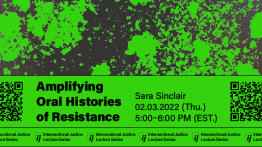Sara Sinclair, "Amplifying Oral Histories of Resistance"
Thursday, February 3, 2022, 5 - 6pm

Oral historians have a reverence for the power of the stories that are shared with us. As practitioners, we also aim to pursue our work through processes that empower our narrators and their larger communities. This talk with How We Go Home: Voices from Indigenous North America editor Sara Sinclair will explore how oral history can challenge oppressive power dynamics and counteract colonial designs to interrupt the transmission of culture and stories. The talk will center the origin and power of stories in an indigenous context, focusing on the role of collective memory and the practical wisdom it contains to protect Indigenous worlds. What happens when we fail to remember our ancestors? And how is the act of remembering and sharing stories an act of resistance?
How We Go Home is the latest book in the series from Voice of Witness, which is a human rights oral history nonprofit that works to amplify the voices of people impacted by injustice. Finally, this talk will explore how the book’s narratives and accompanying curriculum can return the power of the stories to Indigenous youth through teaching materials that are designed to amplify Indigenous voices.
 Sara Sinclair is an oral historian of Cree-Ojibwa and mixed settler descent. Sara teaches in the Oral History Master of Arts Program at Columbia University. She is the editor of How We Go Home: Voices from Indigenous North America (2020, Voice of Witness/Haymarket Books). She has contributed to the Columbia Center for Oral History Research’s Covid-19 Oral History, Narrative and Memory Archive, Obama Presidency Oral History, and Robert Rauschenberg Oral History Project. With Peter Bearman and Mary Marshall Clark, Sinclair edited Robert Rauschenberg: An Oral History (2019, Columbia University Press). Sara’s current and previous clients include the Whitney Museum of American Art, the Museum of the City of New York, and New York City Department of Environmental Protection.
Sara Sinclair is an oral historian of Cree-Ojibwa and mixed settler descent. Sara teaches in the Oral History Master of Arts Program at Columbia University. She is the editor of How We Go Home: Voices from Indigenous North America (2020, Voice of Witness/Haymarket Books). She has contributed to the Columbia Center for Oral History Research’s Covid-19 Oral History, Narrative and Memory Archive, Obama Presidency Oral History, and Robert Rauschenberg Oral History Project. With Peter Bearman and Mary Marshall Clark, Sinclair edited Robert Rauschenberg: An Oral History (2019, Columbia University Press). Sara’s current and previous clients include the Whitney Museum of American Art, the Museum of the City of New York, and New York City Department of Environmental Protection.
This series is co-organized by the Office of Student Affairs and Nada Ayad, Associate Dean of HSS, as a continuation of a reading and discussion series for first-year students that was held as part of the Fall 2020 new student orientation. In the spirit of The Cooper Union mission, the Black Student Union and the Cooper Climate Coalition, along with several other Cooper students and faculty, were deeply involved in the articulation of the program as well as in contributing to the reading list and suggesting speakers.




